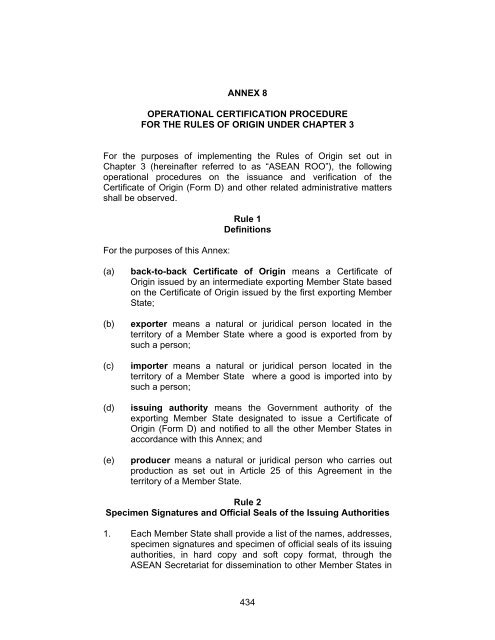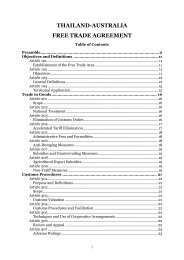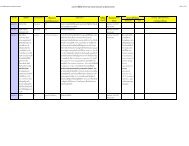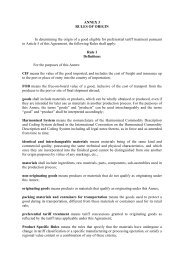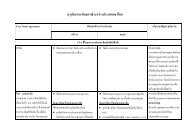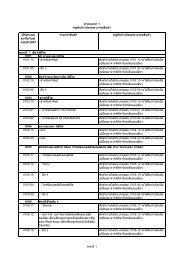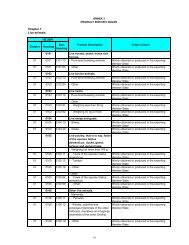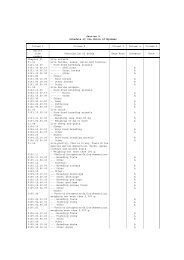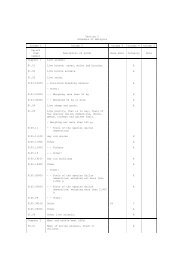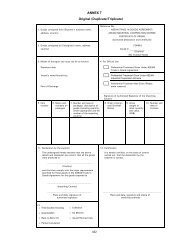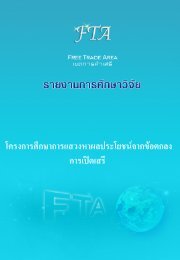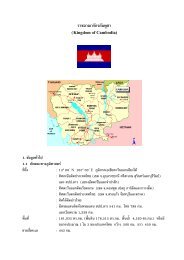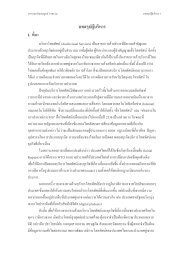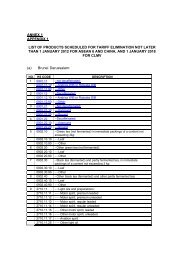434 ANNEX 8 OPERATIONAL CERTIFICATION PROCEDURE ... - FTA
434 ANNEX 8 OPERATIONAL CERTIFICATION PROCEDURE ... - FTA
434 ANNEX 8 OPERATIONAL CERTIFICATION PROCEDURE ... - FTA
Create successful ePaper yourself
Turn your PDF publications into a flip-book with our unique Google optimized e-Paper software.
<strong>ANNEX</strong> 8<strong>OPERATIONAL</strong> <strong>CERTIFICATION</strong> <strong>PROCEDURE</strong>FOR THE RULES OF ORIGIN UNDER CHAPTER 3For the purposes of implementing the Rules of Origin set out inChapter 3 (hereinafter referred to as “ASEAN ROO”), the followingoperational procedures on the issuance and verification of theCertificate of Origin (Form D) and other related administrative mattersshall be observed.For the purposes of this Annex:Rule 1Definitions(a)(b)(c)(d)(e)back-to-back Certificate of Origin means a Certificate ofOrigin issued by an intermediate exporting Member State basedon the Certificate of Origin issued by the first exporting MemberState;exporter means a natural or juridical person located in theterritory of a Member State where a good is exported from bysuch a person;importer means a natural or juridical person located in theterritory of a Member State where a good is imported into bysuch a person;issuing authority means the Government authority of theexporting Member State designated to issue a Certificate ofOrigin (Form D) and notified to all the other Member States inaccordance with this Annex; andproducer means a natural or juridical person who carries outproduction as set out in Article 25 of this Agreement in theterritory of a Member State.Rule 2Specimen Signatures and Official Seals of the Issuing Authorities1. Each Member State shall provide a list of the names, addresses,specimen signatures and specimen of official seals of its issuingauthorities, in hard copy and soft copy format, through theASEAN Secretariat for dissemination to other Member States in<strong>434</strong>
soft copy format. Any change in the said list shall be promptlyprovided in the same manner.2. The specimen signatures and official seals of the issuingauthorities, compiled by the ASEAN Secretariat, shall beupdated annually. Any Certificate of Origin (Form D) issued byan official not included in the list referred to in paragraph 1 shallnot be honoured by the receiving Member State.Rule 3Supporting DocumentsFor the purposes of determining originating status, the issuingauthorities shall have the right to request for supporting documentaryevidence or to carry out check(s) considered appropriate in accordancewith respective laws and regulations of a Member State.Rule 4Pre-exportation Verification1. The producer and/or exporter of the good, or its authorisedrepresentative, shall apply to the issuing authority, inaccordance with the Member State’s laws and regulations,requesting pre-exportation examination of the origin of the good.The result of the examination, subject to review periodically orwhenever appropriate, shall be accepted as the supportingevidence in determining the origin of the said good to beexported thereafter. The pre-exportation examination may notapply to the good of which, by its nature, origin can be easilydetermined.2. For locally-procured materials, self-declaration by the finalmanufacturer exporting under this Agreement shall be used as abasis when applying for the issuance of the Certificate of Origin(Form D).Rule 5Application for Certificate of OriginAt the time of carrying out the formalities for exporting the productsunder preferential treatment, the exporter or his authorisedrepresentative shall submit a written application for the Certificate ofOrigin (Form D) together with appropriate supporting documentsproving that the products to be exported qualify for the issuance of aCertificate of Origin (Form D).435
Rule 6Examination of Application for a Certificate of OriginThe issuing authority shall, to the best of its competence and ability,carry out proper examination, in accordance with the laws andregulations of the Member State, upon each application for aCertification of Origin (Form D) to ensure that:(a)(b)The application and the Certificate of Origin (Form D) are dulycompleted and signed by the authorised signatory;The origin of the product is in conformity with the provisions ofChapter 3 of this Agreement;(c) The other statements of the Certificate of Origin (Form D)correspond to supporting documentary evidence submitted;(d)(e)Description, quantity and weight of goods, marks and number ofpackages, number and kinds of packages, as specified, conformto the products to be exported;Multiple items declared on the same Certificate of Origin (FormD) shall be allowed provided that each item qualifies separatelyin its own right.Rule 7Certificate of Origin (Form D)1. The Certificate of Origin (Form D) must be on ISO A4 size whitepaper in conformity to the specimen shown in Annex 7 of thisAgreement. It shall be made in the English language.2. The Certificate of Origin (Form D) shall comprise one (1) originaland two (2) carbon copies (Duplicate and Triplicate).3. Each Certificate of Origin (Form D) shall bear a referencenumber separately given by each place or office of issuance.4. Each Certificate of Origin (Form D) shall bear the manuallyexecuted signature and seal of the authorised issuing authority.5. The original copy shall be forwarded by the exporter to theimporter for submission to the customs authority at the port orplace of importation. The duplicate shall be retained by theissuing authority in the exporting Member State. The triplicateshall be retained by the exporter.436
Rule 8Declaration of Origin CriterionTo implement the provisions of Article 26 of this Agreement, theCertificate of Origin (Form D) issued by the final exporting MemberState shall indicate the relevant applicable origin criterion in Box 8.Rule 9Treatment of Erroneous Declaration in the Certificate of OriginNeither erasures nor superimpositions shall be allowed on theCertificate of Origin (Form D). Any alteration shall be made by:(a)(b)striking out the erroneous materials and making any additionrequired. Such alterations shall be approved by an officialauthorised to sign the Certificate of Origin (Form D) and certifiedby the issuing authorities. Unused spaces shall be crossed outto prevent any subsequent addition; orissuing a new Certificate of Origin (Form D) to replace theerroneous one.Rule 10Issuance of the Certificate of Origin1. The Certificate of Origin (Form D) shall be issued by the issuingauthorities of the exporting Member State at the time ofexportation or soon thereafter whenever the products to beexported can be considered originating in that Member Statewithin the meaning of Chapter 3 of this Agreement.2. In exceptional cases where a Certificate of Origin (Form D) hasnot been issued at the time of exportation or no later than three(3) days from the declared shipment date, due to involuntaryerrors or omissions or other valid causes, the Certificate ofOrigin (Form D) may be issued retroactively but no longer thanone (1) year from the date of shipment and shall be duly andprominently marked “Issued Retroactively”.Rule 11Back-to-Back Certificate of OriginThe issuing authority of the intermediate Member State may issue aback-to-back Certificate of Origin in an application is made by theexporter, provided that:437
(a)(b)(c)(d)(e)a valid original Certificate of Origin (Form D) is presented. In thecase where no original Certificate of Origin (Form D) ispresented, its certified true copy shall be presented;the back-to-back Certificate of Origin issued should containsome of the same information as the original Certificate of Origin(Form D). In particular, every column in the back-to-backCertificate of Origin should be completed. FOB price of theintermediate Member State in Box 9 should also be reflected inthe back-to-back Certificate of Origin;For partial export shipments, the partial export value shall beshown instead of the full value of the original Certificate of Origin(Form D). The intermediate Member State will ensure that thetotal quantity re-exported under the partial shipment does notexceed the total quantity of the Certificate of Origin (Form D)from the first Member State when approving the back-to-backCertificate of Origin to the exporters;In the event that the information is not complete and/orcircumvention is suspected, the final importing Member State(s)could request that the original Certificate of Origin (Form D) besubmitted to their respective customs authority;Verification procedures as set out in Rules 18 and 19 are alsoapplied to Member State issuing the back-to-back Certificate ofOrigin.Rule 12Loss of the Certificate of OriginIn the event of theft, loss or destruction of a Certificate of Origin (FormD), the exporter may apply in writing to the issuing authorities for acertified true copy of the original and the triplicate to be made out onthe basis of the export documents in their possession bearing theendorsement of the words “CERTIFIED TRUE COPY” in Box 12. Thiscopy shall bear the date of issuance of the original Certificate of Origin.The certified true copy of a Certificate of Origin (Form D) shall beissued no longer than one (1) year from the date of issuance of theoriginal Certificate of Origin (Form D).Rule 13Presentation of the Certificate of Origin1. For the purposes of claiming preferential tariff treatment, theimporter shall submit to the customs authority of the importing438
Member State at the time of import, a declaration, a Certificateof Origin (Form D) including supporting documents (i.e. invoicesand, when required, the through Bill of Lading issued in theterritory of the exporting Member State) and other documents asrequired in accordance with the laws and regulations of theimporting Member State.2. In cases when a Certificate of Origin (Form D) is rejected by thecustoms authority of the importing Member State, the subjectCertificate of Origin (Form D) shall be marked accordingly in Box4 and the original Certificate of Origin (Form D) shall be returnedto the issuing authority within a reasonable period not exceedingsixty (60) days. The issuing authority shall be duly notified ofthe grounds for the denial of tariff preference.3. In the case where Certificates of Origin (Form D) are notaccepted, as stated in the preceding paragraph, the importingMember State should accept and consider the clarificationsmade by the issuing authorities and assess again whether or notthe Form D application can be accepted for the granting of thepreferential treatment. The clarifications should be detailed andexhaustive in addressing the grounds of denial of preferenceraised by the importing Member State.Rule 14Validity Period of the Certificate of OriginThe following time limit for the presentation of the Certificate of Origin(Form D) shall be observed:(a)(b)(c)The Certificate of Origin (Form D) shall be valid for a period oftwelve (12) months from the date of issuance and must besubmitted to the customs authorities of the importing MemberState within that period.Where the Certificate of Origin (Form D) is submitted to thecustoms authorities of the importing Member State after theexpiration of the time limit for its submission, such Certificate ofOrigin (Form D) is still to be accepted when failure to observethe time limit results from force majeure or other valid causesbeyond the control of the exporter; andIn all cases, the customs authorities in the importing MemberState may accept such Certificate of Origin (Form D) providedthat the goods have been imported before the expiration of thetime limit of the said Certificate of Origin (Form D).439
Rule 15Waiver of Certificate of OriginIn the case of consignments of goods originating in the exportingMember State and not exceeding US$ 200.00 FOB, the production ofCertificate of Origin (Form D) shall be waived and the use of simplifieddeclaration by the exporter that the goods in question have originatedin the exporting Member State will be accepted. Goods sent throughthe post not exceeding US$ 200.00 FOB shall also be similarly treated.Rule 16Treatment of Minor Discrepancies1. Where the ASEAN origin of the goods is not in doubt, thediscovery of minor discrepancies, such as typographical error inthe statements made in the Certificate of Origin (Form D) andthose made in the documents submitted to the customsauthorities of the importing Member State for the purpose ofcarrying out the formalities for importing the goods shall not ipsofacto invalidate the Certificate of Origin (Form D), if it does infact correspond to the goods submitted.2. In cases where the exporting Member State and importingMember State have different tariff classifications for a goodsubject to preferential tariffs, the goods shall be released at theMFN rates or at the higher preferential rate, subject to thecompliance of the applicable ROO, and no penalty or othercharges shall be imposed in accordance with relevant laws andregulations of the importing Member State. Once theclassification differences have been resolved, the correct rateshall be applied and any overpaid duty shall be refunded ifapplicable, in accordance with relevant laws and regulations ofthe importing Member State, as soon as the issues have beenresolved.3. For multiple items declared under the same Certificate of Origin(Form D), a problem encountered with one of the items listedshall not affect or delay the granting of preferential treatmentand customs clearance of the remaining items listed in theCertificate of Origin (Form D). Rule 18(c) may be applied to theproblematic items.440
Rule 17Record Keeping Requirement1. For the purposes of the verification process pursuant to Rules18 and 19, the producer and/or exporter applying for theissuance of a Certificate of Origin (Form D) shall, subject to thelaws and regulations of the exporting Member State, keep itssupporting records for application for not less than three (3)years from the date of issuance of the Certificate of Origin (FormD).2. The application for Certificates of Origin (Form D) and alldocuments related to such application shall be retained by theissuing authorities for not less than three (3) years from the dateof issuance.3. Information relating to the validity of the Certificate of Origin(Form D) shall be furnished upon request of the importingMember State by an official authorised to sign the Certificate ofOrigin (Form D) and certified by the appropriate Governmentauthorities.4. Any information communicated between the Member Statesconcerned shall be treated as confidential and shall be used forthe validation of Certificates of Origin (Form D) purposes only.Rule 18Retroactive CheckThe importing Member State may request the issuing authority of theexporting Member State to conduct a retroactive check at randomand/or when it has reasonable doubt as to the authenticity of thedocument or as to the accuracy of the information regarding the trueorigin of the goods in question or of certain parts thereof. Upon suchrequest, the issuing authority of the exporting Member State shallconduct a retroactive check on a producer/exporter’s cost statementbased on the current cost and prices, within a six-month timeframe,specified at the date of exportation subject to the following conditions:(a)The request for retroactive check shall be accompanied with theCertificate of Origin (Form D) concerned and shall specify thereasons and any additional information suggesting that theparticulars given on the said Certificate of Origin (Form D) maybe inaccurate, unless the retroactive check is requested on arandom basis;441
(ii)The written notification mentioned in paragraph (a)(i) shallbe as comprehensive as possible including, amongothers:(1) the name of the customs authorities issuing thenotification;(2) the name of the exporter/producer whosepremises are to be visited;(3) the proposed date for the verification visit;(4) the coverage of the proposed verification visit,including reference to the goods subject of theverification; and(5) the names and designation of the officialsperforming the verification visit.(iii)Obtain the written consent of the exporter/producerwhose premises are to be visited.(b)(c)(d)(e)When a written consent from the exporter/producer is notobtained within thirty (30) days upon receipt of the notificationpursuant to paragraph (a)(i), the notifying Member State, maydeny preferential treatment to the goods that would have beensubject of the verification visit.The issuing authority receiving the notification may postpone theproposed verification visit and notify the importing Member Stateof such intention. Notwithstanding any postponement, anyverification visit shall be carried out within sixty (60) days fromthe date of such receipt, or for a longer period as the concernedMember States may agree.The Member State conducting the verification visit shall providethe exporter/producer whose goods are the subject of theverification and the relevant issuing authority with a writtendetermination of whether or not the subject goods qualify asoriginating goods.Any suspended preferential treatment shall be reinstated uponthe written determination referred to in paragraph (d) that thegoods qualify as originating goods.443
(f)(g)The exporter/producer will be allowed thirty (30) days, fromreceipt of the written determination, to provide in writingcomments or additional information regarding the eligibility of thegoods. If the goods are still found to be non-originating, the finalwritten determination will be communicated to the issuingauthority within thirty (30) days from receipt of thecomments/additional information from the exporter/producer.The verification visit process, including the actual visit anddetermination of whether the subject goods are originating ornot, shall be carried out and its results communicated to theissuing authority within a maximum of one hundred and eighty(180) days. While awaiting the results of the verification visit,Rule 18(c) on the suspension of preferential treatment shall beapplied.Rule 20ConfidentialityMember States shall maintain, in accordance with their laws, theconfidentiality of classified business information collected in theprocess of verification pursuant to Rules 18 and 19 and shall protectthat information from disclosure that could prejudice the competitiveposition of the person who provided the information. The classifiedbusiness information may only be disclosed to those authoritiesresponsible for the administration and enforcement of origindetermination.Rule 21Documentation for Implementing Article 32(2)(b)(Direct Consignment)For the purposes of implementing Article 32(2)(b) of this Agreement,where transportation is effected through the territory of one or morenon-Member State, the following shall be produced to the Governmentauthorities of the importing Member State:(a)(b)(c)A through Bill of Lading issued in the exporting Member State;A Certificate of Origin (Form D) issued by the relevantGovernment authorities of the exporting Member State;A copy of the original commercial invoice in respect of thegoods; and444
(d)Supporting documents in evidence that the requirements ofArticle 32(2)(b) paragraphs (i), (ii) and (iii) of this Agreement arebeing complied with.Rule 22Exhibition Goods1. Goods sent from an exporting Member State for exhibition inanother Member State and sold during or after the exhibition forimportation into a Member State shall be granted preferentialtreatment accorded under this Agreement on the condition thatthe goods meet the requirements as set out in Chapter 3 of thisAgreement, provided that it is shown to the satisfaction of therelevant Government authorities of the importing Member Statethat:(a)(b)(c)An exporter has dispatched those goods from the territoryof the exporting Member State to the Member Statewhere the exhibition is held and has exhibited them there;The exporter has sold the goods or transferred them to aconsignee in the importing Member State;The goods have been consigned during the exhibition orimmediately thereafter to the importing Member State inthe state in which they were sent for the exhibition.2. For the purposes of implementing paragraph 1, the Certificate ofOrigin (Form D) shall be provided to the relevant Governmentauthorities of the importing Member State. The name andaddress of the exhibition must be indicated. The relevantGovernment authorities of the Member State where theexhibition took place may provide evidence together withsupporting documents prescribed in Rule 21(d) for theidentification of the products and the conditions under whichthey were exhibited.3. Paragraph 1 shall apply to any trade, agricultural or craftsexhibition, fair or similar show or display in shops or businesspremises with the view to the sale of foreign goods and wherethe goods remain under customs control during the exhibition.445
Rule 23Third Country Invoicing1. Relevant Government authorities in the importing Member Stateshall accept Certificates of Origin (Form D) in cases where thesales invoice is issued either by a company located in a thirdcountry or by an ASEAN exporter for the account of the saidcompany, provided that the goods meet the requirements ofChapter 3 of this Agreement.2. The exporter shall indicate “third country invoicing” and suchinformation as name and country of the company issuing theinvoice in the Certificate of Origin (Form D).Rule 24Action against Fraudulent Acts1 When it is suspected that fraudulent acts in connection with theCertificate of Origin (Form D) have been committed, theGovernment authorities concerned shall cooperate in the actionto be taken in the respective Member State against the personsinvolved.2. Each Member State shall provide legal sanctions for fraudulentacts related to the Certificate of Origin (Form D).446


